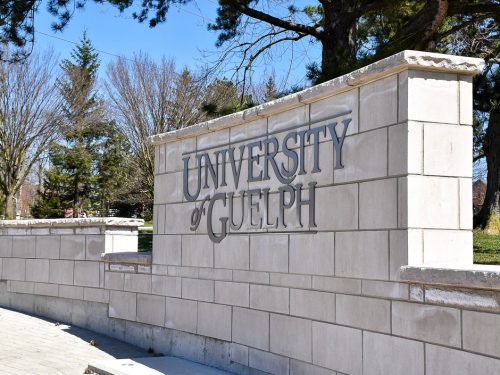 The University of Guelph continues to rank among Canada’s top comprehensive research institutions in an annual national survey.
The University of Guelph continues to rank among Canada’s top comprehensive research institutions in an annual national survey.
U of G placed second out of 13 comprehensive universities – those with a full range of graduate programs and professional schools but not including a medical school – in the 2018 Research Infosource Inc.’s Canada’s Top 50 Research Universities.
The University was ranked 16th overall among the 50 universities surveyed.
This marks the fourth consecutive year the University has placed second among the comprehensive universities in the ranking.
The University of Waterloo placed first in the category, while the University of Toronto ranks first overall and is tops among 16 universities with medical schools.
Malcolm Campbell, U of G’s vice-president (research), said this year’s standing reflects the University’s many research strengths, as well as the dedication of its researchers and the timeliness of their research.
“U of G consistently ranks among the finest research universities in our country, an accomplishment we work intensively hard to achieve and that we are very proud of,” Campbell said.
“It is particularly gratifying to see that we are first in a number of measures, including research intensity and the amount of research income we attract from the private sector. Clearly our people are excelling at research that addresses contemporary needs and is dedicated to improving life on the planet.”
The rankings are based on several measurements, including total sponsored research income, the number of publications in leading journals and research impact.
The data, collected primarily from Statistics Canada, is from the 2017 fiscal year.
Among comprehensive universities, U of G was second in the overall value of its research income, worth more than $140 million a year. It ranked first in research intensity, or average research dollars per faculty member ($184,100) and graduate student ($52,000). Among Canada’s comprehensive universities, U of G ranked first in corporate research income with $99.9 million.
Three university categories are included in the rankings – those with a medical school, those with graduate programs but no medical school, and those with undergraduate programs only.
“For over 15 years, Research Infosource has been tracking the research performance of the Canadian university system as a whole,” said company CEO Ron Freedman. “One objective is to shine light on how our top research universities are doing in relation to their own performance over time and that of their peers.”
Freedman said the annual ranking and analysis helps institutions and policy-makers measure the university research enterprise across the country.
U of G has research prowess in a growing array of areas, notably in agri-food and the bio-economy, veterinary sciences, human health, arts and social sciences.
- Biomedical sciences professor Tami Martino, director of the Centre for Cardiovascular Investigations at U of G, has attracted international attention for applying leading-edge circadian biology to treat and prevent cardiovascular disease.
- Food science professor Gisèle LaPointe holds the NSERC/DFO (Dairy Farmers of Ontario) Industrial Research Chair in Dairy Microbiology. A world-leading food microbiologist, particularly in milk and dairy products, she studies pathogens responsible for food-borne disease and works with industry to enhance food safety and productivity with genomic tools.
- In the Bioproducts Discovery and Development Centre, U of G researchers use leading-edge processing equipment to make bioproducts from recycled plastics and natural fibres. Intended for the food and automotive industries, these products reduce plastic waste while using agricultural residues.
- Engineering professor Graham Taylor is on the cutting edge of studies in machine learning — how computers and robots can think and act more like humans. He aims to improve machine vision systems in consumer devices such as home security systems.
- U of G scientists are heavily involved in studying climate change impacts in the Canadian North. An ecosystem ecologist, Prof. Merritt Turetsky, Department of Integrative Biology, studies those impacts in the Arctic and boreal biomes, including their effects on soil health and water quality.
- Ajay Heble, School of English and Theatre Studies, is creating ImprovLab, a global hub for community-engaged performance research and impacts on audience, youth and community. A publicly accessible and flexible space for advanced studies of improvisational artistic practices, the project will receive more than $5 million in funding from public and private partners.
Research Infosource Inc.’s Canada’s Innovation Leaders 2018 will be distributed across Canada in November and globally via Global Affairs Canada offices in December. The publication is titled Making a Difference: Research Impacts in Communities, Canada and Internationally.